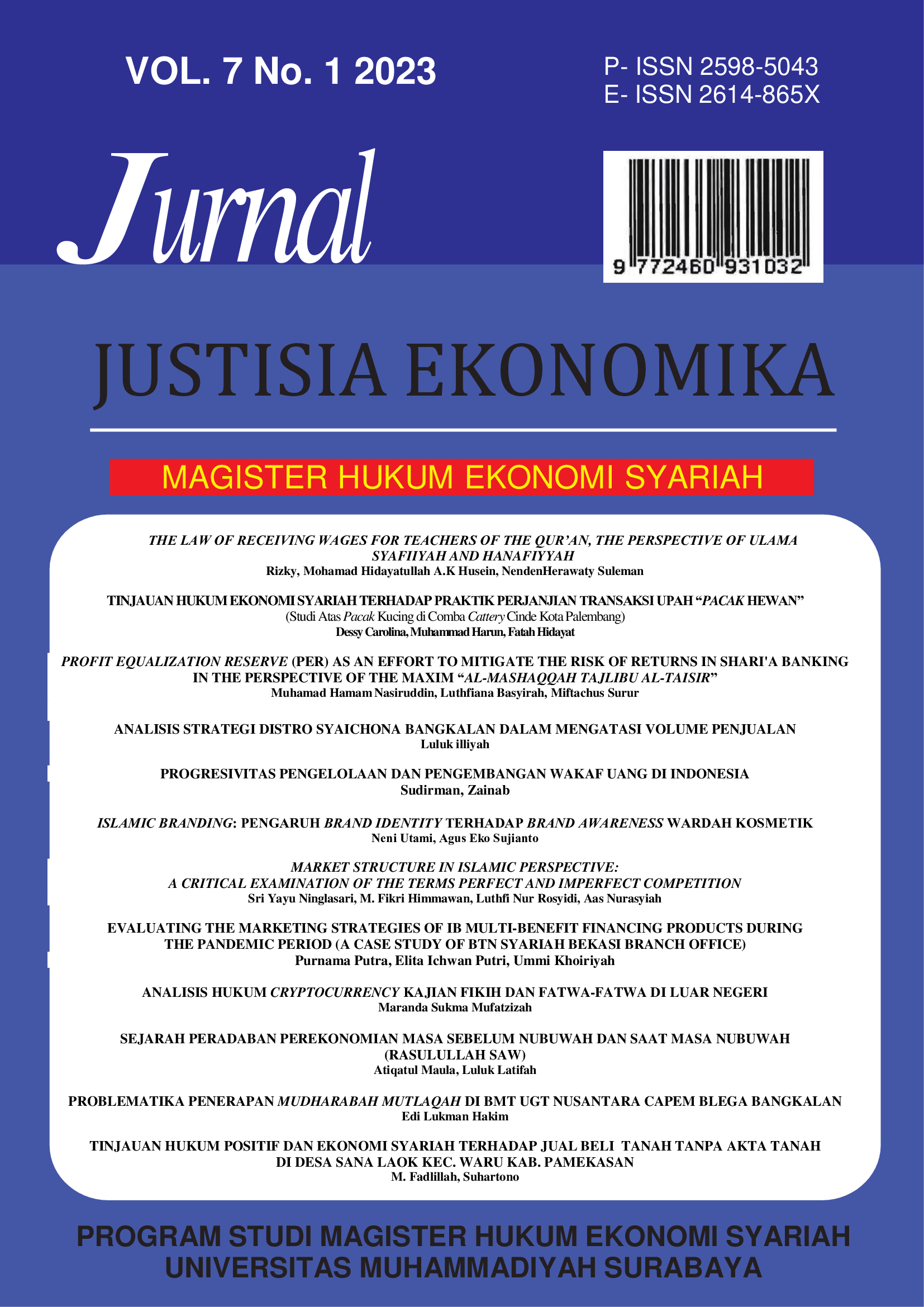ANALISIS HUKUM CRYTOCURRENCY KAJIAN FIQH DAN FATWA-FATWA DI LUAR NEGERI
DOI:
https://doi.org/10.30651/justeko.v7i1.18313Abstrak
Cryptocurrency is the first application of blockchain technology, but the potential of this technology is not limited to the monetary system and its widespread adoption is still a worldwide topic causing many countries to hide this cryptocurrency. Here the author tries to assess crypto assets based on studies of fikih and fatwa abroad. In this study the authors used sociological legal research, this research method serves to see the law in a real sense and examine how the law works in society. To analyze existing theories, this study uses a conceptual approach to analyze existing theories so that solutions to legal problems can be found. The results in this study are that there are two thoughts, the first school of thought argues that cryptocurrencies can be used for payments, remittances, and storing assets as long as users know in detail the types of cryptocurrencies, the second opinion is prohibited in the eyes of Sharia because of excessive risks for individuals, countries and no clear laws. conclusions in this study. In the view of fikih scholars who allow it to refer to the understanding that fluctuations in crypto are not classified as gharar, especially for people who have cryptocurrency knowledge. from the results of the fatwa analysis of the permissibility of cryptocurrency, namely in Malaysia, LBM PWNU Yogyakarta Indonesia and in China in accordance with the fatwa and legal provisions, while those that prohibit it are in Middle Eastern countries and LBM PWNU East Java Indonesia.
Keywords: Cryptocurrency, Fikih and Fatwa Studies
Referensi
Afrizal, Afrizal, Marliyah Marliyah, and Fuadi Fuadi. “Analisis Terhadap Cryptocurrency (Perspektif Mata Uang, Hukum, Ekonomi Dan Syariah).†E-Mabis: Jurnal Ekonomi Manajemen dan Bisnis 22, no. 2 (2021): 13–41.
Aibak, Kutbuddin. “Penalaran Istislahi Sebagai Metode Pembaharuan Hukum Islam.†Al-Manahij: Jurnal Kajian Hukum Islam, 2013.
Arrahmah, Syifa. Hasil Bahtsul Masail Tentang Halal Dan Haram Transaksi Kripto. Jakarta, 2021. https://www.nu.or.id/nasional/hasil-bahtsul-masail-tentang-halal-dan-haram-transaksi-kripto-IhUDC.
Cretarola, Alessandra, and Gianna Figà -talamanca Cyril. “Blokchain and Cryptocurrencies: Economic and Financial Research.†Decisions in Economics and Finance 44, no. 2 (2021): 781–787. https://doi.org/10.1007/s10203-021-00366-3.
Eza. “Hukum Majlis Agama Berkaitan Aset Digital (Mata Wang Kripto) Seperti Bitcoin.†Maret 5 2021. Yogyakarta, 2021. https://www.majalahlabur.com/pelaburan/hukum-majlis-agama-berkaitan-aset-digital-mata-wang-kripto-seperti-bitcoin/.
GarcÃa-Corral, Francisco Javier, José Antonio Cordero-GarcÃa, Jaime de Pablo-Valenciano, and Juan Uribe-Toril. “A Bibliometric Review of Cryptocurrencies: How Have They Grown?†Financial Innovation 8, no. 1 (2022): 31. https://doi.org/10.1186/s40854-021-00306-5.
Giudici, Giancarlo, Alistair Milne, and Dmitri Vinogradov. “Cryptocurrencies: Market Analysis and Perspectives.†Journal of Industrial and Business Economics 47, no. 1 (2020): 1–18. https://doi.org/10.1007/s40812-019-00138-6.
Gowda, Nandan, and Chandrani Chakravorty. “Comparative Study on Cryptocurrency Transaction and Banking Transaction.†Global Transitions Proceedings 2, no. 2 (2021): 530–534. https://doi.org/10.1016/j.gltp.2021.08.064.
Ida Madieha Abd Ghani Azmi, Nazli Ismail Nawang. “Cryptocurrency: An Insight Into the Malaysian Regulatory Approach.†Psychology and Education Journal 58, no. 2 (2021): 1645–1652.
Jati, Hardian Satria, and Ahmad Arif Zulfikar. “Transaksi Cryptocurrency Perspektif Hukum Ekonomi Syariah.†Jurnal Al-Adalah 6, no. 2 (2021): 137–148. https://media.neliti.com/media/publications/361163-none-28995abd.pdf.
Muhaimin. Metode Penelitian Hukum. Edited by Fatia Hijriyanti. Pertama. Mataram, 2020.
Munajat, Makhrus. “Metode Penemuan Hukum Dalam Perspektif Filsafat Hukum Islam.†asy-Syir’ah 42, no. I (2008): 179–203.
Nisa, Madha Ratu, and Muhammad Rofiq. “The Renewal of Islamic Economic Law Hukum Cryptocurrency Perspektif Fiqh Kontemporer.†Al-Ikhtisar 2, no. 2 (2021): 91–96.
Opir, Dato’ Dr. Haji Anhar Bin Haji. Hukum Matawang Kripto (Cryptocurrency) : Satu Analisa Syarak, 2021.
Rafii, Raha. “FatwÄs on Cryptocurrency: The Syrian Islamic Council and the International Union of Muslim Scholars’ Al-Qaradaghi.†April 29 2022. Yogyakarta, 2022. https://islamiclaw.blog/2022/04/29/the-syrian-islamic-councils-cryptocurrency-fatwa/.
Rashid, Audil, Walid Bakry, and Somar Al-Mohamad. “Are Cryptocurrencies a Future Safe Haven for Investors? The Case of Bitcoin.†Economic Research-Ekonomska Istrazivanja 36, no. 2 (2022): 1–28. https://doi.org/10.1080/1331677X.2022.2140443.
Rohman, M. Arif. “LBM PWNU DIY: Crypto Halal.†Bangkit Media.Com, 2021. https://bangkitmedia.com/lbm-pwnu-diy-crypto-halal/.
Syaifullah. Bahtsul Masail NU Jatim Putuskan Cryptocurrency Haram, 2021. https://jatim.nu.or.id/metropolis/bahtsul-masail-nu-jatim-putuskan-cryptocurrency-haram-yvs6f.
Tarmizi, Luqman. “Bayan Linnas Siri Ke-153: Hukum Penggunaan Matawang Bitcoin.†Mufti Of Federal Territory’s Office, 2018. https://muftiwp.gov.my/en/perkhidmatan/artikel-soal-jawab/2773-bayan-linnas-153-hukum-penggunaan-mata-wang-bitcoin.
المصرية, دار الإÙتاء. ما Øكم العمل بالمضاربة البيتكوين؟. Mesir: www.youtube.com, 2020. https://www.youtube.com/watch?v=yIm_Xem6CPw.
Unduhan
Diterbitkan
Cara Mengutip
Terbitan
Bagian
Lisensi
HAK CIPTA
Penulis yang mengirimkan artikel dalam jurnal Justisia Ekonomika harus memahami dan menyetujui persyaratan tentang hak cipta jurnal Justisia Ekonomika sebagai berikut:
1. Hak Cipta tulisan / artikel yang diterbitkan di jurnal Justisia Ekonomika otomatis menjadi hak pengelola jurnal atau publisher
2. Meskipun Hak Cipta atas tulisan yang telah diterbitkan di jurnal Justisia Ekonomika adalah menjadi haknya publisher, tetapi penulis masih mempunyai hak untuk : a). Penulis boleh meng-upload di repository kampus, b). Penulis boleh meng-upload di webnya sendiri, c). Penulis boleh meng-upload di google schoolar, orchid dan sinta
LISENSI
Lisensi atas tulisan / artikel yang diterbitkan di jurnal Justisia Ekonomika adalah menggunakan Creative Commons dengan atribusi CC-BY-NC 4.0






















